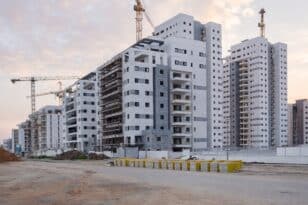The Israeli Supreme Court has temporarily halted a large urban renewal (pinui-binui) project in Tel Aviv due to claims that the building permits were issued illegally. The case revolves around a dispute between the municipality and the development company over whether the approved construction exceeds legal zoning rights under the national earthquake reinforcement plan, TAMA 38. This high-profile conflict underscores the risks of buying in Israel, particularly when projects rely on complex planning approvals. While a lower court ordered the city to issue permits and approve a betterment tax assessment, the Supreme Court accepted the city’s appeal and ruled to suspend the project until the matter is resolved.
By Adv. Ron Ben Ezra with the assistance of intern Reut Mastai
In this legal update, we review the Supreme Court’s decision to suspend the execution of a ruling by the Tel Aviv-Jaffa Administrative Court on December 17, 2024. That ruling had accepted a development company’s petition to compel the Tel Aviv Local Planning Committee and the Tel Aviv-Jaffa Municipality to issue building permits and a betterment levy assessment.
Case Background:
The case centers around a pinui-binui (evacuation and reconstruction) project promoted by a development company at 36 Lohamei Galipoli in Tel Aviv-Jaffa. The plan calls for the demolition of two existing apartment buildings and the construction of four new buildings with 92 residential units, under TAMA 38 guidelines for earthquake reinforcement. In 2022, the the Tel Aviv Local Planning Committee approved the project’s building permits, subject to certain conditions.
Over several years, the building company progressed through the planning process, securing approvals, paying fees and taxes, and engaging with professionals and business partners. However, once the permits were granted and construction was moving forward, the Tel Aviv-Jaffa Municipality—through the Deputy City Engineer—claimed the approved construction exceeded the TAMA 38 guidelines by about 550 square meters of main area. According to the municipality, this made the permits illegal.
In response, the building company and property owners filed a petition with the Administrative Court. The court ruled in their favor, ordering the municipality and the Local Planning Committee to issue the permits and the betterment levy. The Tel Aviv Municipality appealed the decision to the Supreme Court and requested a stay of execution.
Legal Arguments & Questions:
The Tel Aviv Municipality and Local Planning Committee argued that the permits exceeded the allowed building volume under TAMA 38 by 550 square meters. They claimed this was based on a flawed calculation using a “theoretical floor” from older plans instead of the actual permitted floors. They requested that the permits be sent back for reconsideration, emphasizing that allowing construction would cause irreversible changes, such as demolition and tenant displacement, rendering any appeal meaningless.
On the other hand, the building company and property owners argued that the permits were issued after a 7-year planning process involving coordination with city officials, compliance with conditions, and reliance from third parties, such as banks, suppliers, and buyers. They accused the municipality of backtracking on legally made decisions and said the discrepancies did not warrant canceling the permits—especially under the unique circumstances of the project. They also claimed that the lower court accepted their version, making the chances of a successful appeal low and therefore not justifying a stay.
The case underscores the risks of buying in Israel, especially in projects where municipal permits are still in dispute. The main question was whether to delay enforcement of the Administrative Court’s decision that required the municipality to issue the building permits and betterment levy assessment.
Two related legal questions also arose:
- What are the chances that the appeal will succeed—specifically, is there a valid claim that the permits violate TAMA 38, rendering them illegal?
- How does the balance of convenience between the parties affect the decision to suspend execution? This weighs the irreversible harm from demolition and displacement against the financial harm to the building company if the project is delayed.

Court Ruling:
Justice Yael Willner of the Supreme Court granted the request to suspend the execution of the lower court’s ruling. The court found that the appeal had merit, especially given the municipality’s argument of a significant violation of TAMA 38 that had not been fully addressed by the Administrative Court. The court also held that the balance of convenience favored a suspension, since beginning construction could lead to irreversible consequences, including demolishing buildings and displacing tenants.
The court stated: “At first glance—and without setting anything in stone—it appears the appeal cannot be ruled out. The core of this case is the claim that the permits are illegal due to a substantial deviation from TAMA 38 of about 550 square meters. Given that the Administrative Court did not directly address the legality question, the issue may justifiably be reexamined in the appeal, potentially leading to the permits’ cancellation.”
Accordingly, the court ordered a suspension of the ruling, conditional upon the deposit of a bank guarantee and a personal commitment to compensate the building company and property owners if the appeal fails.
This ruling is a reminder of the risks of buying in Israel, especially in projects that depend on contested permits or are in the middle of ongoing appeals. Buyers, developers, and investors should be aware of the legal vulnerabilities that may delay or derail planned developments.
Gindi Caspi & Co. is one of Israel’s most prominent law firms in real estate, planning and zoning, and urban renewal. With decades of extensive experience handling complex and large-scale real estate transactions, the firm is consistently ranked among the top-tier firms in these fields by all major rating companies. Notably, the international LEGAL 500 recognized Gindi Caspi & Co. as a Leader in real estate, planning, and zoning and highlighted Adv. Ziv Caspi as a Leading Individual in Israeli law. The firm has also received numerous accolades, including ranking among the top real estate law firms (Dun’stars) in planning, zoning, and urban renewal. It was honored as a “pillar and cornerstone in fulfilling the nation’s vision for building and settling the land.” For five consecutive years, the firm has been ranked first in Israel in the field of urban renewal.
For inquiries, contact law@gindi-caspi.co.il.







